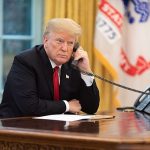In an exciting turn of events, President Trump has reaffirmed his position as a dominant figure on the global stage, especially with his recent actions involving Iran. It seems that he believes in a very straightforward approach to diplomacy: get tough when necessary and never back down. Some are even dubbing this the Trump Doctrine. According to sources, the President is not shy about expressing his dissatisfaction with both allies and adversaries when it comes to military strategies and geopolitical agreements. This hard-nosed approach seems to be shaking things up in a world often plagued by indecision.
Recently, Trump made headlines by launching a significant military strike against Iran’s nuclear program, utilizing a technique involving bunker-buster bombs that reportedly left no stone unturned. In a stunning display of military might, the weapons penetrated deep underground, making what once was Fordow practically non-existent. While such aggressive tactics come with risks, they are aimed at ensuring that Iran stops its nuclear ambitions once and for all. With the potential for peace on the horizon, it’s clear that the stakes couldn’t be higher.
However, as always, not everyone is singing Trump’s praises. Just days after the strike, there was talk of a cease-fire, but critics wasted no time in slinging mud at the President. His decision to take military action invoked the ire of some Congressional Democrats, who are now claiming he violated the War Powers Act. It’s a curious twist, considering previous administrations have often engaged in similar military operations without facing the same level of scrutiny. It begs the question: When did partisanship overshadow national interest?
In reality, the Constitution empowers the President as the commander-in-chief of the armed forces, which allows for military action without constant congressional oversight. This historical precedent is something that has been overlooked in favor of political theatrics. Back in the days after 9/11, Congress granted additional powers to presidents for situations related to terrorism, which is exactly what Iran represents. The timing of these accusations seems more like a maneuver to undermine Trump’s successes, rather than a genuine concern for constitutional order.
Returning to the issue at hand, Trump’s administration appears focused on securing lasting peace. Achieving this requires not only military tactics but also thoughtful strategies to ensure Iran recognizes Israel and is held accountable for any past actions regarding nuclear material. The idea is to include thorough checks and balances so that Iran can’t simply rebuild its capabilities under the radar. Though the road ahead may be long and fraught with challenges, the glimpse of a more stable Middle East is something that many are willing to work for.
In the grand scheme of things, the President’s recent actions have shaken up international relations and showcased his reluctance to follow the traditional playbook. While the mainstream media and political opponents may spin his tactics as reckless, supporters argue that he is finally taking a stand against the unfriendly regimes that threaten not just Israel, but global peace as we know it. President Trump’s approach may not resonate with everyone, but it seems clear that he is determined to leave a mark on the world stage—a mark that could very well lead to a new chapter in diplomatic relations.




